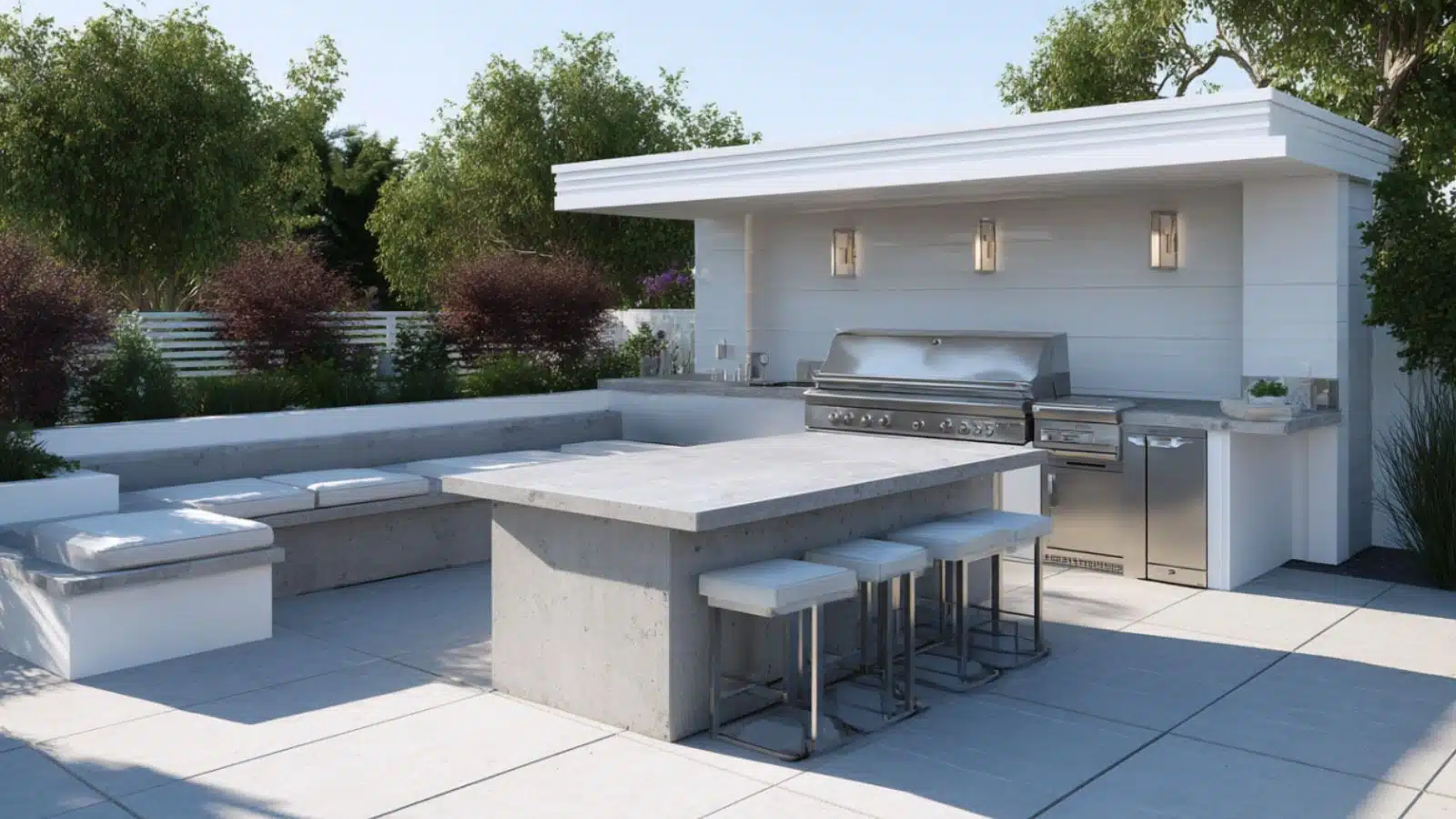Minimalist Outdoor Kitchen Ideas for a Clean and Sophisticated Aesthetic
Table of Contents
How much does your outdoor cooking area reflect simplicity and style? A well-designed minimalist outdoor kitchen can transform your backyard into a serene and functional retreat. According to design experts, outdoor living is the fastest-growing home improvement trend, and minimalism is no longer just a style—it’s a lifestyle choice that emphasizes calm, clarity, and clean lines.
A minimalist outdoor kitchen offers more than just visual appeal—it’s about purposeful design. By focusing on essential elements, you create a space that feels spacious, organized, and effortlessly chic. Whether you’re a weekend grill master or an entertainer at heart, a streamlined cooking area enhances usability without overwhelming the senses.
In this post, we’ll explore curated minimalist outdoor kitchen ideas that combine form and function. From material choices and layout planning to subtle lighting, smart storage, and seamless integration, each section shares practical steps, visual breakdowns, and inspirational MidJourney prompts. Ready to create a sleek backyard oasis? Let’s dive into timeless outdoor design.
Choose a Sleek Material Palette for Visual Harmony
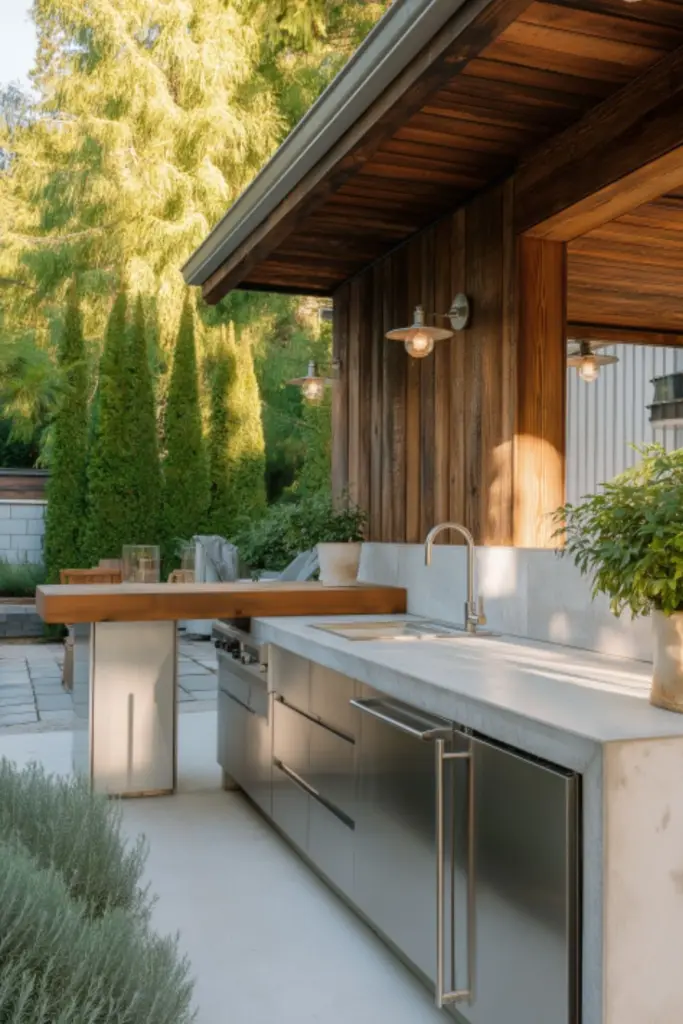
Minimalist design starts with choosing materials that look cohesive and feel serene. Stick to a neutral palette—think brushed stainless steel, concrete, stone, and wood in light or medium tones. These materials work well together and stand the test of time.
Brushed stainless offers a modern, clean finish and pairs beautifully with honed concrete counters. Add accents of warm wood slats or decking to soften the kitchen’s look. Avoid mixing too many colors or textures, which can clutter the aesthetic.
Minimalist materials are also low-maintenance. Stonework resists weathering, stainless steel stays clean, and concrete is durable. It’s quality that looks good and simplifies upkeep.
Material Palette at a Glance
| Material | Aesthetic Role | Care & Maintenance |
|---|---|---|
| Brushed stainless steel | Contemporary and clean | Wipe monthly with mild soap |
| Honed concrete | Subtle texture, modern feel | Seal annually to prevent staining |
| Light wood accents | Warmth and contrast | Oil or seal every 6–12 months |
| Natural stone | Timeless sophistication | Clean with stone-safe products |
Simple Layout Planning for Seamless Workflow
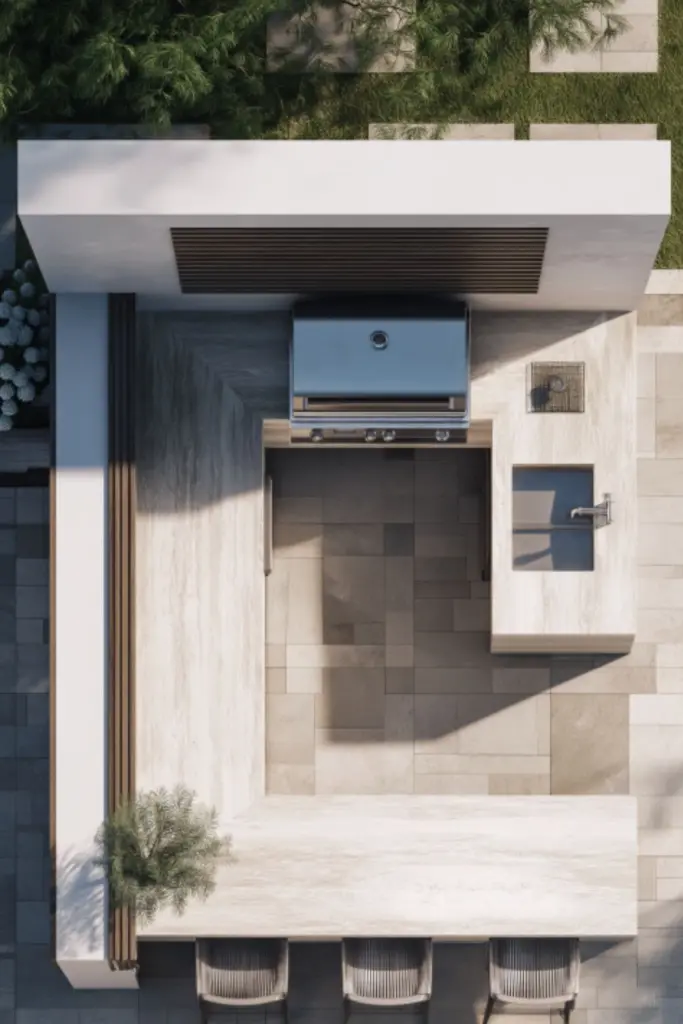
A well-thought-out layout will give your outdoor kitchen a polished, effortless flow. Minimalism is about clarity, so choose a layout that keeps everything within reach while minimizing clutter.
Popular efficient layouts include straight-line kitchens when space is narrow, L-shaped designs for corner setups, and U-shaped layouts if you have more room. Focus on the work triangle principle—keeping sink, grill, and prep counter within easy reach.
Plan for clear zones: grilling, prep, and cleaning. This prevents overlap and makes the area feel organized. Avoid overloading with appliances—include only what you use regularly, such as a grill, small fridge, and a sink.
Layout Comparison
| Layout Type | Best For | Workflow Benefit |
|---|---|---|
| Straight-line | Narrow patios or decks | Easy linear setup, no wasted space |
| L-shaped | Corner areas | Natural prep and grilling zones |
| U-shaped | Spacious backyard corners | Wraparound work triangle layout |
Integrated Storage That Fades Into View
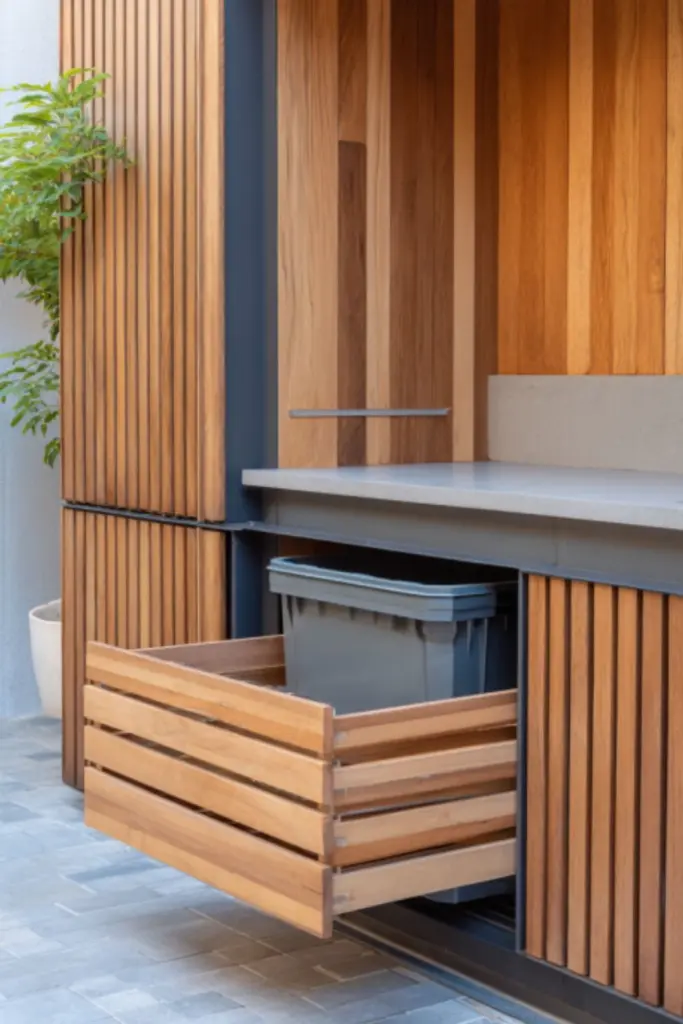
Minimalism isn’t just visual—it’s also operational. Thoughtful storage keeps essentials accessible and hidden from sight. Use integrated drawers and cabinets with flush fronts that align with your material palette.
Consider adding pull-out bins to hide trash or recycling. Vertical slatted wood drawers add warmth while concealing compartments. If wood isn’t ideal for outdoor cabinetry, powder-coated aluminum or stainless steel work beautifully and resist weathering.
Minimize visible clutter by stowing utensils, cutting boards, and oils inside cabinets. Add slim wire racks for wine or dish storage that slides into drawers. This keeps countertops minimal and performance smart.
Storage Elements Guide
| Storage Type | Purpose | Aesthetic Impact |
|---|---|---|
| Flush front drawers | Cookware and utensils | Clean, uninterrupted surfaces |
| Pull-out bins | Waste management | Tidy and discrete |
| Vertical racks | Cutting boards, pans | Organized, no countertop clutter |
| Hidden hinge cabinets | Cleaning supplies, oils | Invisible storage |
Low-Key Lighting to Enhance Evening Use
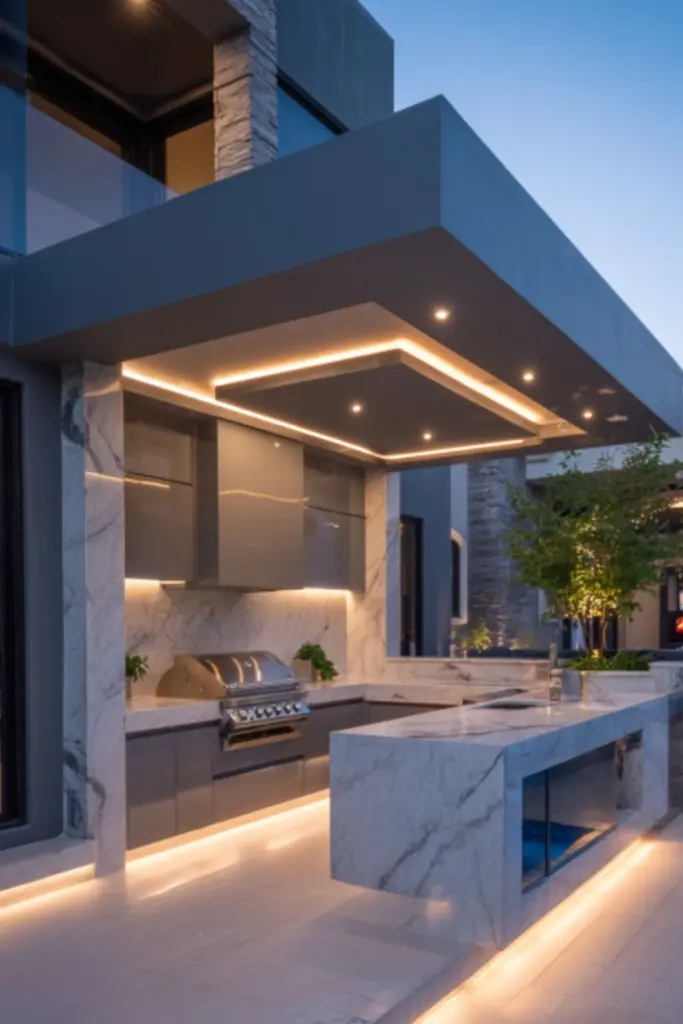
Lighting in a minimalist outdoor kitchen must be discreet yet purposeful. You want to see clearly without harsh glare. The key is layering subtle sources into the architecture.
Start with recessed task lights under upper cabinets or over counters. These don’t protrude and deliver focused light. Add integrated deck or toe-kick lighting below cabinets to softly illuminate the floor. Overhead, a slim recessed ceiling strip creates ambient glow without interrupting sightlines.
Accent lighting, like hidden LED strips along the grill platform, makes the space feel elevated. Choose warm white sequential tones to maintain harmony with natural materials.
Minimalist Lighting Breakdown
| Light Type | Placement | Effect |
|---|---|---|
| Recessed task lights | Under cabinets, over countertops | Crisp, shadow-free prep lighting |
| Toe-kick lights | Cabinet base edges | Safe navigation after dark |
| Ceiling strips | Along overhead structure | General ambient light |
| Accent LED strips | Grill/platform edges | Subtle elegance, functional trims |
Strategic, quiet lighting ensures your outdoor kitchen feels both welcoming and uncluttered after sunset.
Natural Accents for Warmth and Contrast
Clean minimalism can feel cold without natural accents. Introduce greenery, wood textures, or stone planters to bring life and visual warmth to the space.
Incorporate sleek planter boxes filled with fresh herbs (rosemary, basil) just steps from the prep area—organic accents that are as functional as beautiful. Use wood slats to define niches or back panels; they break up stainless or concrete surfaces without clutter.
Add a single decorative feature, like a sculptural stone sink or textured backsplash tile behind the grill. Keep scale modest; a few well-placed elements are more effective than multiple.
Natural Accent Options
| Accent Type | Purpose | Suggested Placement |
|---|---|---|
| Herb planters | Color, scent, practical use | Along prep counter edge |
| Wood slat backdrop | Warm texture | Behind grill or under counter area |
| Stone feature piece | Visual centerpiece | On island side or counter corner |
| Potted greenery | Softens edges, adds color | Corner or countertop topiary |
Durable Minimalist Hardware and Fixtures
No minimal kitchen is complete without hardware that matches the aesthetic. Choose streamlined fixture styles—matte black, brushed nickel, or stainless steel—for faucets and cabinet pulls.
Opt for wall-mounted faucets to save counter space. Pick retractable hose spray systems with clean lines. Handleless cabinets with touch-latch mechanisms enhance sleekness further.
Keep finishes consistent—don’t mix metals. Consistency in small details elevates the overall sense of refinement.
Fixture & Hardware Summary
| Component | Style | Visual Benefit |
|---|---|---|
| Faucet | Retractable hose, wall-mounted | Clean countertop, modern convenience |
| Handles | Minimal bar or touch-latch | Smooth surfaces, uninterrupted fronts |
| Surface finishes | Satin black or steel | Consistent, cohesive visual palette |
| Accessories | Matching towel hooks, bins | Coordinated, low-key detailing |
Easy-Clean Hardened Surfaces for Longevity
Minimalist design shines when surfaces stay spotless. Choose countertops in polished concrete, quartz, or ceramic slabs with minimal grout lines. These materials resist stains and wipes clean.
For flooring, polished concrete or large-format porcelain tiles in neutral tones provide durable, easy-care surfaces. Avoid porous natural stones unless sealed; they require upkeep.
Add an outdoor rug made of polypropylene under the seating area—weather-resistant and easy to hose off when needed.
Surface Maintenance Guide
| Surface Type | Care Tips | Longevity |
|---|---|---|
| Concrete/quartz counters | Wipe weekly, seal annually | Durable and highly scratch-resistant |
| Porcelain tile flooring | Damp mop, occasional scrub | Fade- and moisture-resistant |
| Polypropylene rug | Hose off every few weeks | UV- and mold-resistant |
| Matte metals | Mild soap & water cleaning | Stainless resists weathering |
A focus on low-maintenance surfaces ensures your minimalist design remains clean and pristine with minimal effort.
Seasonal Adaptation with Modular Design
Minimalist outdoor kitchens should adapt to changing seasons. Use modular elements like removable countertops, roll-away islands, and fold-down prep surfaces.
Stow removable cushions and accessories when not in use. During colder months, wrap plumbing-insulated pipes, secure cabinet doors, and protect with breathable covers.
Seasonal décor stays pared-back: a single ceramic vase, a neutral lantern, or a simple plant make an understated statement without disrupting the minimalist aesthetic.
Seasonal Prep Checklist
| Task | Solution | Benefit |
|---|---|---|
| Protect plumbing | Wrap with insulation tape | Prevents freezing and damage |
| Store cushions/accessories | Stackable bins with lids | Keeps area tidy during winter |
| Modular counters | Detachable bar-top for storage | Saves space and ease of use |
| Seasonal décor switch | Swap a single neutral vase or plant | Keeps look fresh yet minimalist |
Conclusion
Minimalist outdoor kitchen ideas deliver a harmonious blend of elegance, functionality, and simplicity. By adhering to a neutral material palette, streamlined layouts, hidden storage, discreet lighting, natural accents, and quality surfaces, you can create an outdoor cooking space that’s both beautiful and breezily usable.
Every detail—from recessed lighting and hidden bins to seasonal modular design—helps reinforce a calm, uncluttered ambiance. The result? A clean, sophisticated backyard kitchen that feels luxurious yet unpretentious—a space you’ll enjoy year-round with effortless style.

